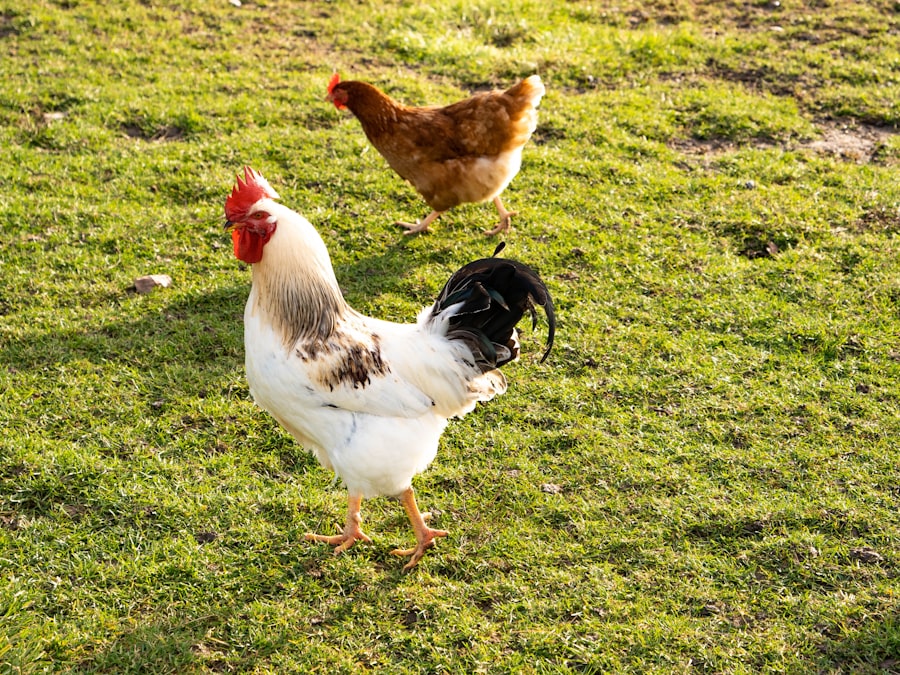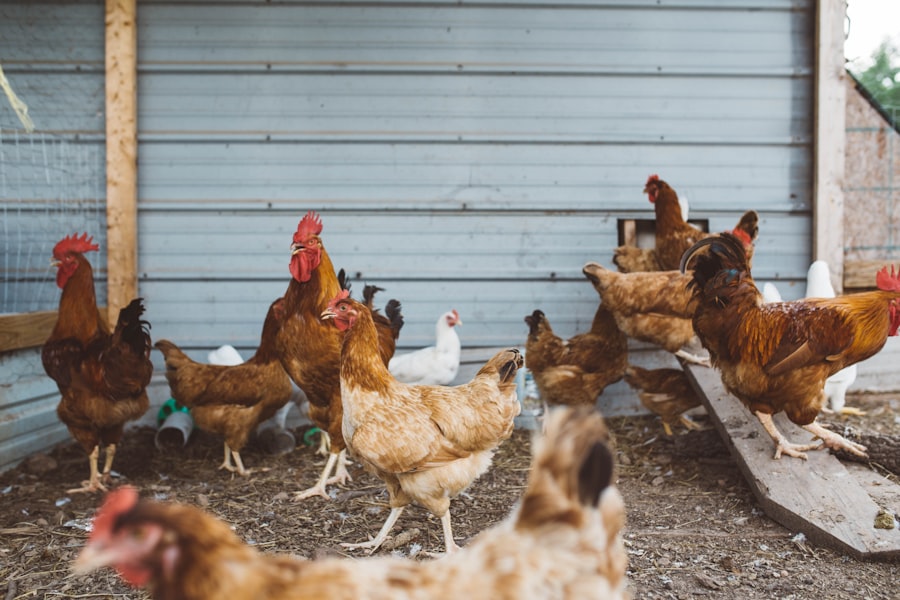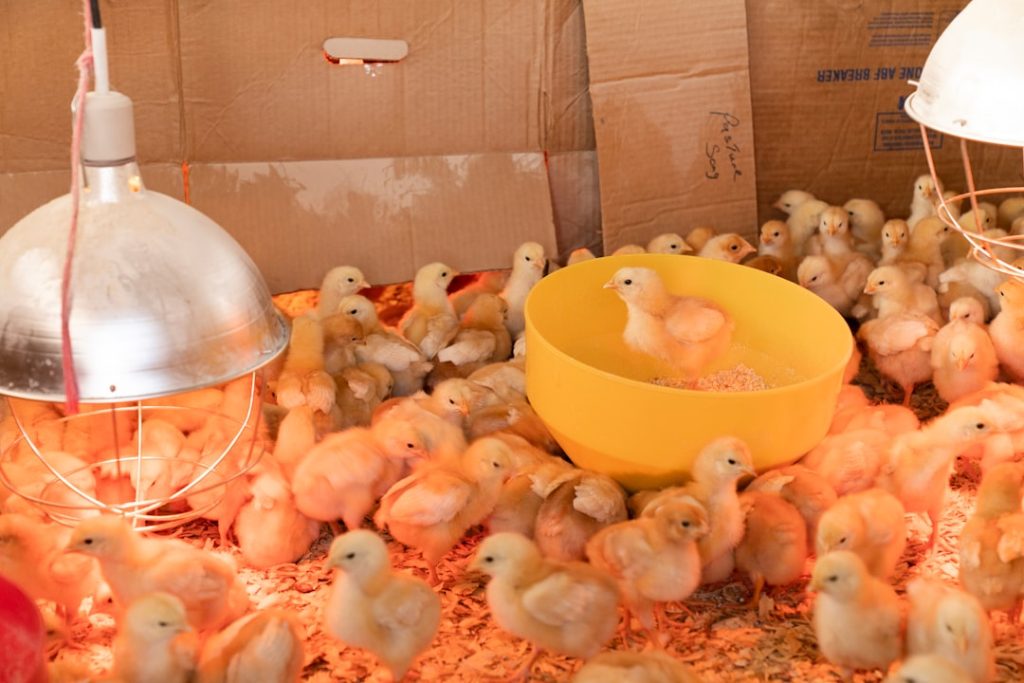Chicken enrichment is crucial for maintaining the health and well-being of a flock. Chickens have innate instincts and behaviors that require fulfillment for optimal health. When chickens lack stimulation, they may develop negative behaviors such as feather pecking, aggression, and reduced egg production.
Providing appropriate enrichment activities can help prevent these issues and promote a thriving flock. Enrichment activities also contribute to the mental and physical health of chickens. Mental stimulation and exercise are beneficial for chickens, just as they are for humans.
Offering opportunities for natural behaviors like foraging, dust bathing, and exploration helps keep chickens mentally and physically active. These activities not only prevent negative behaviors but also enhance overall well-being and contentment in the flock. Ultimately, chicken enrichment serves dual purposes: preventing undesirable behaviors and promoting positive physical and mental health outcomes.
By addressing these needs, chicken keepers can ensure a happier, healthier, and more productive flock.
Table of Contents
- 1 Providing a stimulating environment for your chickens
- 2 Introducing enrichment activities for your chickens
- 3 Incorporating natural foraging opportunities
- 4 Creating a safe and secure space for your chickens to explore
- 5 Monitoring and rotating enrichment activities
- 6 Considering the individual preferences of your chickens
- 7 FAQs
Key Takeaways
- Keeping chickens amused is important for their mental and physical well-being
- A stimulating environment includes space to roam, perches, and hiding spots
- Enrichment activities like hanging treats or providing toys can keep chickens engaged
- Natural foraging opportunities like scattering food or providing access to grass and bugs are beneficial
- Creating a safe and secure space is essential for allowing chickens to explore and play
- Monitoring and rotating enrichment activities helps prevent boredom
- Considering individual preferences, such as favorite treats or activities, can enhance the enrichment experience for chickens
Providing a stimulating environment for your chickens
Providing Variety and Texture
One way to create a stimulating environment is by incorporating a variety of perches, roosts, and hiding spots for your chickens to explore and interact with. Additionally, providing different textures such as straw, sand, and grass can also help stimulate your chickens’ senses and keep them engaged.
Encouraging Natural Behaviors
Another important aspect of creating a stimulating environment for your chickens is providing opportunities for natural behaviors such as foraging and dust bathing. By incorporating natural elements such as logs, branches, and dirt patches into their living space, you can encourage your chickens to engage in these natural behaviors, which can help keep them amused and fulfilled.
Promoting Well-being
Overall, creating a stimulating environment for your chickens is essential for promoting their mental and physical well-being. By providing a diverse and engaging living space, you can help keep your chickens happy, healthy, and entertained.
Introducing enrichment activities for your chickens

Introducing enrichment activities for your chickens is a great way to keep them amused and engaged. There are many different types of enrichment activities that you can provide for your flock, including hanging treats, puzzle feeders, and even toys. Hanging treats such as cabbage or corn on the cob can provide both mental stimulation and physical exercise for your chickens as they peck and jump to reach the treats.
Puzzle feeders, such as treat balls or DIY feeders made from PVC pipes, can also provide mental stimulation as your chickens work to access the food inside. In addition to food-based enrichment activities, you can also provide toys and objects for your chickens to interact with. This can include items such as mirrors, hanging objects, or even simple DIY toys made from household items.
These types of enrichment activities can help keep your chickens amused and engaged, while also providing opportunities for them to exhibit natural behaviors such as pecking, scratching, and exploring. Overall, introducing enrichment activities for your chickens is an important aspect of keeping them happy and fulfilled.
Incorporating natural foraging opportunities
Incorporating natural foraging opportunities into your chickens’ environment is an important aspect of keeping them amused and engaged. Foraging is a natural behavior for chickens, and providing opportunities for them to engage in this behavior can help keep them mentally and physically stimulated. One way to incorporate natural foraging opportunities is by scattering food or treats around their living area for them to search for and peck at.
This can mimic the natural behavior of foraging for insects and seeds in the wild. Another way to incorporate natural foraging opportunities is by providing access to a designated foraging area where you can scatter food or create a compost pile for your chickens to explore. This can provide them with opportunities to engage in natural behaviors such as scratching, pecking, and dust bathing, which can help keep them amused and fulfilled.
Overall, incorporating natural foraging opportunities into your chickens’ environment is an important aspect of promoting their overall well-being.
Creating a safe and secure space for your chickens to explore
Creating a safe and secure space for your chickens to explore is essential for keeping them amused while also ensuring their safety. This can include providing a secure coop and run area that is protected from predators and the elements. Additionally, it’s important to regularly inspect the fencing and other structures in their living area to ensure that there are no potential hazards or escape routes.
In addition to providing a safe environment, it’s also important to consider the layout and design of their living space. This can include providing areas for shelter, perches, and hiding spots where your chickens can feel safe and secure while they explore. By creating a safe and secure space for your chickens to explore, you can help promote their overall well-being while also keeping them amused and engaged.
Monitoring and rotating enrichment activities

Observing Your Flock’s Behavior
Regularly observing your flock’s interactions with the enrichment activities you provide is essential. This helps you determine which activities are most effective in keeping them amused and identify any potential issues or hazards that may arise.
Preventing Boredom with Rotation
In addition to monitoring their interactions, it’s vital to rotate the enrichment activities you provide on a regular basis. This prevents boredom and ensures your chickens remain engaged with their environment. By introducing new toys, treats, or other enrichment activities regularly, you can keep your flock entertained while providing them with new opportunities for mental stimulation and physical exercise.
Benefits of Enrichment Activity Rotation
Rotating enrichment activities offers numerous benefits, including keeping your chickens engaged, stimulated, and active. This, in turn, can lead to a happier, healthier flock.
Considering the individual preferences of your chickens
Considering the individual preferences of your chickens is an important aspect of keeping them amused and fulfilled. Just like humans, chickens have their own unique personalities and preferences when it comes to enrichment activities. Some may prefer certain types of toys or treats over others, while others may enjoy different types of activities or interactions.
By observing your flock on an individual basis, you can gain insight into their preferences and tailor the enrichment activities you provide to suit their individual needs. This can help ensure that each chicken in your flock remains amused and engaged while also promoting their overall well-being. Overall, considering the individual preferences of your chickens is an important aspect of keeping them happy and fulfilled in their environment.
In conclusion, keeping chickens amused is an essential aspect of promoting their overall well-being and happiness. By providing a stimulating environment, introducing enrichment activities, incorporating natural foraging opportunities, creating a safe and secure space for exploration, monitoring and rotating enrichment activities, and considering the individual preferences of your flock, you can help ensure that your chickens remain happy, healthy, and fulfilled in their living environment.
If you’re looking for ways to keep your chickens entertained, you might also be interested in learning about whether guinea fowl can live with chickens. This article from Poultry Wizard discusses the compatibility of guinea fowl and chickens, providing valuable insights for poultry owners. Check it out here for more information on this topic.
FAQs
What are some ways to keep chickens amused?
Some ways to keep chickens amused include providing them with a spacious and stimulating environment, offering them a variety of toys and objects to peck at and explore, and allowing them access to fresh grass and insects for foraging.
Why is it important to keep chickens amused?
Keeping chickens amused is important for their overall well-being and mental stimulation. Boredom can lead to negative behaviors such as feather pecking and aggression, so providing them with activities and enrichment can help prevent these issues.
What are some examples of toys and objects that chickens enjoy?
Chickens enjoy pecking at hanging treats, such as cabbage or lettuce, as well as objects like mirrors, hanging CDs, and even simple items like pinecones and branches. They also enjoy dust baths and access to fresh grass and insects for foraging.
How much space do chickens need to stay amused?
Chickens need a minimum of 2-3 square feet of space per bird inside the coop, and at least 8-10 square feet of outdoor space per bird. Providing them with a spacious environment allows them to move around, explore, and engage in natural behaviors.
Are there any specific activities that can help keep chickens amused?
Activities such as scattering scratch grains for them to peck at, providing them with a dust bath area, and hanging treats for them to peck at can help keep chickens amused. Additionally, allowing them access to a variety of natural materials and objects to explore can also provide enrichment.
Meet Walter, the feathered-friend fanatic of Florida! Nestled in the sunshine state, Walter struts through life with his feathered companions, clucking his way to happiness. With a coop that’s fancier than a five-star hotel, he’s the Don Juan of the chicken world. When he’s not teaching his hens to do the cha-cha, you’ll find him in a heated debate with his prized rooster, Sir Clucks-a-Lot. Walter’s poultry passion is no yolk; he’s the sunny-side-up guy you never knew you needed in your flock of friends!







